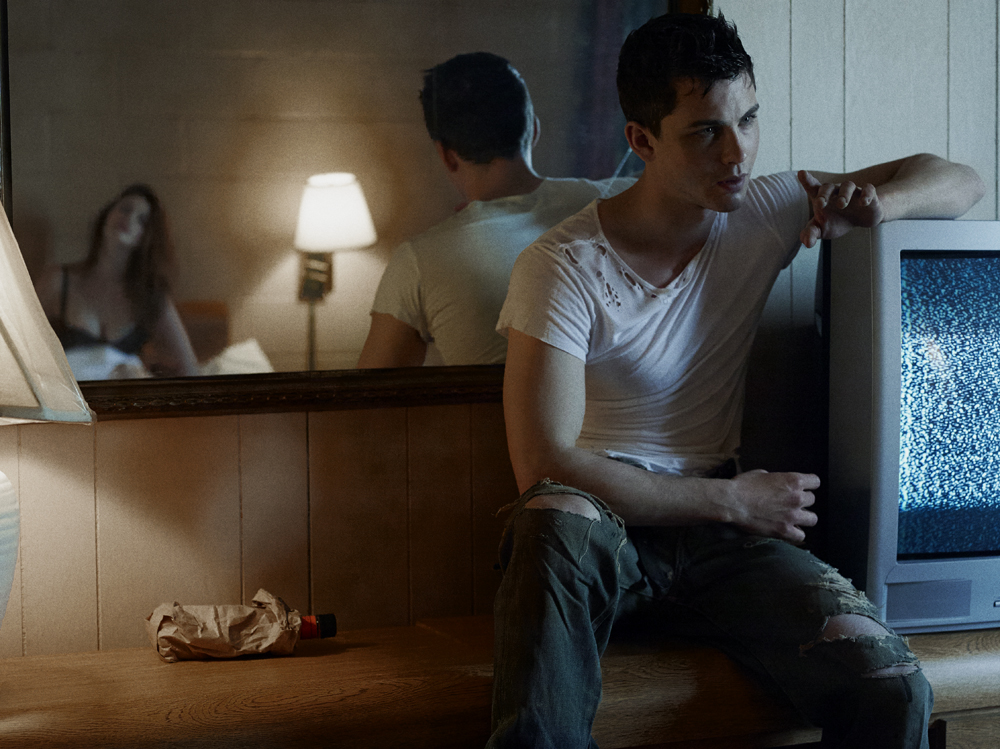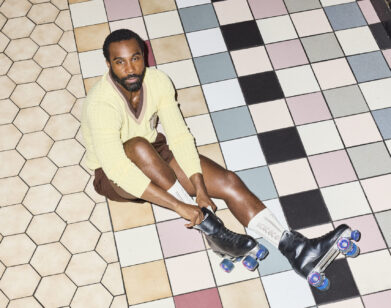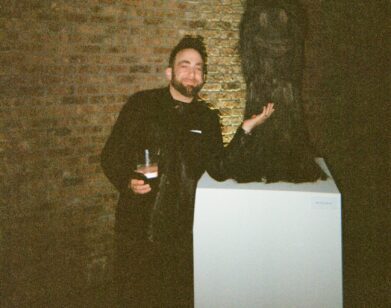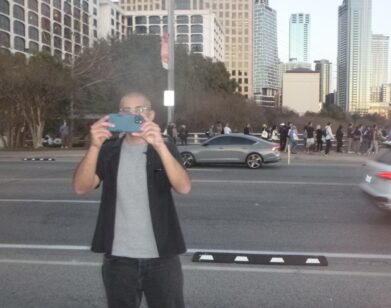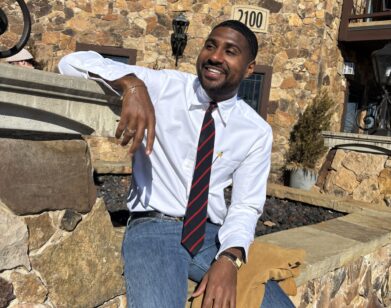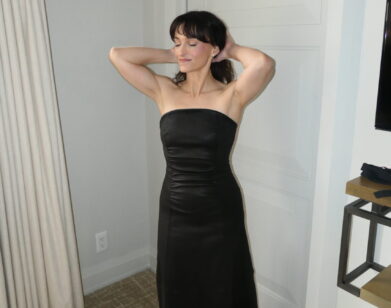Logan Lerman
I just DID MY FIRST LOVE SCENE. IT REALLY WASN’T THAT BAD. I HAD BUILT IT UP TO BE SO MUCH MORE than IT WAS. I KEPT PSYCHING MYSELF OUT. BUT THEN, YOU STICK TO the SCRIPT, AND IT’S a CHARACTER, so IT’S A LOT EASIER. Logan Lerman
There is a wonderful moment near the end of The Perks of Being a Wallflower (2012) when the titular high school shy-guy, played by Logan Lerman, takes leave of himself, transported by the euphoric cocktail of friendship and adolescence and glee. In a pique of ebullience, he announces, “I can see it. This one moment when you know you’re not a sad story. You are alive … And in this moment, I swear we are infinite.” The moment is doubly wonderful as it coincides with Lerman’s own crossing over as a performer. It is in that moment that audience members—at least those who may have missed him as the swashbuckling half-god teen Percy Jackson in that fantasy franchise—went wow. At that moment he came alive and, in Hollywood terms, was probably infinitely in-demand.
Lerman, who grew up in Los Angeles, began acting at 5 years old, often playing the hero’s son, first with Mel Gibson in The Patriot (2000) and later with Christian Bale alongside Russell Crowe in 3:10 to Yuma (2007). It is a trend he’ll continue this spring, playing the rascal middle kid to Crowe’s ark-builder visionary (and brother to his Wallflower co-star Emma Watson) in Darren Aronofsky‘s Biblical epic Noah. Later this year, Lerman, now 22, will step into the fray as a full-fledged leading man, going to cinematic war alongside Brad Pitt and Shia LaBeouf in David Ayer’s not-yet-titled five-men-in-a-tank drama.
But even as he has come of age and come into his own as a performer, the self-confessed film geek and musical autodidact isn’t ashamed to maintain a few heroes. Chief among them is the great Michael Shannon, whose unnerving performances make him every actor’s favorite actor. We invited Lerman, who was in New York putting his pants on after our shoot, to call Shannon, who was in New Orleans filming Jeff Nichols‘s sci-fi drama Midnight Special, and talk about his first time (on screen).
LOGAN LERMAN: How you been, man? How’s the shoot going?
MICHAEL SHANNON: I can’t complain, we had a fun day today. I was getting tied up and beaten up, all that good stuff—everything that makes movies exciting. Where are you?
LERMAN: I’m in New York right now. I came out here for the photo shoot for this piece.
SHANNON: How many outfits did you put on?
LERMAN: Um … there wasn’t a lot of clothing involved.
SHANNON: I find it exhausting sometimes, changing my clothes over and over again. Takes a lot of energy, lot of mental concentration. Has anyone ever asked you to get emotional, like, cry or something, in a shoot?
LERMAN: I’ve had photographers who tried to direct me like that and I just can’t do it. Still photos are so uncomfortable. There’s something about 24 frames per second that’s more freeing. I mean, when it’s just one frame at a time … not to mention they threw this beautiful, naked model in the middle of this shoot. You take an awkward guy and you make it more awkward.
SHANNON: What the hell? Was there any temptation there? Were you able to restrain yourself?
LERMAN: I was able to restrain myself.
SHANNON: Have you ever had to do any big, hot scenes in movies?
LERMAN: I just did my first one. It really wasn’t that bad. I had built it up to be so much more than it was. I kept psyching myself out. But then, you stick to the script, and it’s a character, so it’s a lot easier.
SHANNON: So you’re done with the David Ayer film?
LERMAN: Done.
SHANNON: I heard that project took, like, eight months. Did you have to do a lot of training?
LERMAN: Yeah, there was a lot of prep. Ayer was adamant about us being there for the whole process. We worked on it for about four months before shooting.
SHANNON: Whoa, intense. Was it just doing a lot of running and push-ups, or was there anything more specific?
LERMAN: Well, some of the stuff I can’t talk about. But, some of the cool stuff was, like, meeting with World War II veterans and with guys who were about to be deployed. We met with a bunch of military advisors—just constantly talking to people and picking their brains on war and their experiences. I’ve never been through a prep experience like that. That was so intense and so long.
SHANNON: You didn’t have to do that for the Percy Jackson movies?
LERMAN: [laughs] No, man. That was all physical stuff.
SHANNON: Have you seen a lot of World War II motion pictures?
LERMAN: A ton.
SHANNON: Did you think there was something in particular that was going to set this apart from our rather broad scope of World War II dramas?
LERMAN: Yeah, I haven’t seen a good tank movie in a long time. The last one I can really think of was Kelly’s Heroes [1970]. And that was a comedy.
SHANNON: Did Brad Pitt boss you around a lot?
LERMAN: Oh, a ton. He tortured me. All the guys did. I play the new guy that gets his ass beat in every scene. And these guys tortured me every day on set.
SHANNON: Jesus. So it’s a lot like your experience on Noah?
LERMAN: [laughs] Yeah, exactly. Noah was a vacation. Noah was paradise.
SHANNON: There are some really great actors in the Ayer film with you—Shia and Michael Peña, and who’s the other fellow?
LERMAN: Jon Bernthal.
SHANNON: Obviously, if you were riding around in the tank, you had to build some pretty strong relationships. Did you get a little sad that you weren’t going to be seeing these guys every day?
LERMAN: It was kinda like I had Stockholm Syndrome. These guys were so horrible to me at first, and then, after a while, I really respected them. I had a lot of love for them. And I still do. But I still keep in mind that they treated me like shit for a lot of it.
SHANNON: Hey, what goes around comes around. So, I understand that you’ve been acting since you were 5 years old?
LERMAN: Yeah, it’s been a while.
SHANNON: Do you think you’ll still be acting when you’re 80 years old? You think you’ll pull out 75 years of acting?
LERMAN: That’d be nice. I just like doing what we do.
SHANNON: But your relationship with acting must have changed as you’ve grown older. I can’t imagine you enjoy doing it for the same reasons now as you did when you were 5.
LERMAN: No, I was kind of guided into acting by my mom, and as a kid, I did it for fun. It was just a way to get out of school. But then I grew this great passion for film and really appreciated the position that I was in, and I was like, “I’m going to start acting.” I started doing roles and working with people that I really respected and became passionate about the art form of acting. And I’m still trying to figure it out. Still learning, you know?
SHANNON: Can you pinpoint a project where you had a realization that your connection to acting was going to another level? Or becoming more—for lack of a better word—serious?
LERMAN: 3:10 to Yuma. It kind of opened my eyes to what it’s all about, what a character is, how to approach a character.
SHANNON: Did you find yourself gathering some wisdom from the people who you were around?
LERMAN: Yeah, I did. But I’m quiet. I’m pretty shy on set. I didn’t really pick the brains of the actors I was working with. I just kind of did it my way.
SHANNON: That’s true. One doesn’t really go up to people on set and say, “So, how do you think I should do this?”
LERMAN: Exactly. It’s really about just finding your own comfort ability and understanding your character and all that, so I just decided to go for it.
SHANNON: In Noah, do you have long hair and a beard?
LERMAN: Ha-ha. No. I wish I could grow a beard, man. I can’t grow facial hair for shit.
SHANNON: There are hormones you can take for that.
LERMAN: I’ve tried ’em all. It put hair in all the wrong places.
BRAD PITT TORTURED ME. ALL the GUYS DID. I PLAY THE NEW GUY that GETS HIS ASS BEAT IN EVERY SCENE. AND these GUYS TORTURED ME every DAY on SET. Logan Lerman
SHANNON: Oh, Jesus.
LERMAN: It’s a bad story.
SHANNON: Yeah, “Hair in All the Wrong Places” is not a good title for a story.
LERMAN: Nope. It’s my autobiography.
SHANNON: Oh, Jesus. “The Logan Lerman Story.” But seriously, Noah is presumably about Noah’s Ark? And you play his son, correct?
LERMAN: Yeah. I play his middle child.
SHANNON: Is the middle child a little more rebellious than the other ones?
LERMAN: I guess so. He’s the biblically “wicked” child, which basically translates to: he questions things. He questions the Creator’s word and his father’s word, so he’s the wicked child.
SHANNON: That’ll get you in some hot water. No pun intended. Get it? So does he get punished for this? I’m not a Bible enthusiast—does he get 40 licks or whatever?
LERMAN: He does get punished.
SHANNON: Well, first of all, his name’s Ham, right? That’s kind of punishment right there. [Lerman laughs] Russell Crowe is Noah. Was it like seeing an old friend, working with Russell again?
LERMAN: I thought he wouldn’t remember me, so when I first saw him, I introduced myself. I assumed he wouldn’t know who the hell I was.
SHANNON: He told me a story about Henry Cavill, who plays Superman. He said that he remembered Henry from when Henry was a child coming up to ask for his advice while they were on set. So if he can remember Henry from being a kid in a movie, he’s probably going to remember you from 3:10 to Yuma.
LERMAN: He’s got a great memory, or he’s bullshitting and he looked it all up right before meeting both of us.
SHANNON: No, no, I really do think he remembers. You grew up in Los Angeles?
LERMAN: Yes, I did.
SHANNON: I’ve got to confess, I’ve got a couple of kids myself and sometimes—
LERMAN: You just had a baby, congratulations.
SHANNON: Oh, thank you very much. I’ve got two now. But sometimes people will say, “Are you going to live in L.A.?” And I look at my children and think, “I couldn’t possibly take my children to Los Angeles—that would be terrible.” But you grew up out there and you turned out all right. I just get scared, like, how do you not become a drug addict or something?
LERMAN: It is a weird place to grow up. But I guess you could say that about any major city.
SHANNON: That’s true. I’m in New York City right now. Did you see Kids? Not a good movie to see as a parent. I remember the first time I saw it, I was like, “This is the greatest movie I’ve ever seen!” And now that I have two daughters, I just keep thinking about Chloë Sevigny in that movie; it’s like a horror film.
LERMAN: I can imagine. Must be nerve-racking to have two young daughters.
SHANNON: Did you ever go skateboarding at Venice Beach as a kid, or were you always on set?
LERMAN: I did that pretty often, but I was never really the coordinated, athletic guy. I always made short films and shit like that growing up.
SHANNON: Where does one watch these short films?
LERMAN: My buddy actually put them on YouTube when we were kids. It’s kind of embarrassing that they’re online, but that’s what we did for fun growing up. Other kids played sports, other kids did drugs. We made movies, basically—horror movies, comedies—just spontaneous little creations that came out of 14-year-olds with nothing to do.
SHANNON: Damn, I wish I would’ve had a camera when I was a kid. Are you going to continue to make your own movies?
LERMAN: It’s something I’d like to do eventually. But I’m really passionate about acting right now.
SHANNON: I always feel bad for the director on the set. It just seems like too much work. Today on set, the day kind of fell down around my director, Jeff Nichols. I could see it happening.
LERMAN: And he’s amazing, man.
SHANNON: He’s my favorite. But people don’t realize how much goes into these things. I mean, every little second of film that you’re watching, how much work goes into it. The days of sitting in a director’s chair with a martini, that’s over. It’s down-and-dirty stuff when you’re making something like the David Ayer film—there’s no glamour to it. I wanted to tell you that I really loved your performance in The Perks of Being a Wallflower. I loved that movie in general. Your co-star, Ezra Miller, what’s he like?
LERMAN: He’s awesome—a really good actor, a free spirit. He’s kind of that same character in the movie. I love that guy.
SHANNON: How were you able to capture your character’s experience so well? You’ve been acting since you were 5 years old, so you are probably in such a different situation in terms of getting attention and having people like you. And your character is kind of lonely and messed up.
LERMAN: I was kind of like my character Charlie in high school. I was pretty shy and a little bit of a wallflower myself. He kind of reminded me of two friends I grew up with who I was very close with, so I took a lot from them and put it into that role.
SHANNON: And Emma Watson. She was also quite spectacular, and she’s in Noah as well.
LERMAN: She plays my sister this time.
SHANNON: Your sister. Probably a pretty different relationship.
LERMAN: Very different, although our characters didn’t really interact that much in Noah.
SHANNON: I hear you play music. What do you play, the kazoo?
LERMAN: I do. I play the kazoo, a little bit of the harmonica, steel drum. Those are my primaries.
SHANNON: What are you, Jamaican?
LERMAN: [laughs] You know, I’ve asked myself that question before. No, I play the piano and drums and guitar and things like that. Do you play music at all?
SHANNON: Yes, I have a band.
LERMAN: No shit.
SHANNON: Yeah. I wasn’t going to bring it up because this is supposed to be about you, but, yeah, I have a band. We’re called Corporal.
LERMAN: What do you do in the band?
SHANNON: I breakdance mostly. No, I play piano, bass, and guitar—I’m the frontman. What do you do with your music? Do you record it? Do you put it on the internet?
LERMAN: No. I keep that for myself. I like to jam. I play with my friends’ bands, but I’ve never put anything out there. It’s something I’ve always wanted to do, but once I started working more, I couldn’t commit to bands because I was just going to take off in a month.
SHANNON: Do you do, like, Alicia Keys covers?
LERMAN: Oh, I love Alicia Keys. How did you know that? Are you a mind reader?
SHANNON: And Lady Gaga? She played the piano and sang a song at the YouTube Music Awards that I thought was very powerful. Did you see that? She cried while she was playing the piano and singing.
LERMAN: Multitasking.
SHANNON: Yeah. It was kind of shocking to see such a heartfelt performance in the middle of the YouTube Music Awards.
LERMAN: I didn’t even know there was a YouTube Music Awards.
SHANNON: The first one was this year—I played in a short film for a DJ named Avicii. Before our performance, he showed up and he checked me out. He looked me over and he gave his sign of approval, although he made me change my shirt.
LERMAN: Is this for real, man, because I’m going to look this up.
SHANNON: This is all for real. Spike Jonze directed it. It was one of the main reasons I did it, because I wanted to meet Spike Jonze.
LERMAN: I’m a huge fan.
SHANNON: I heard that you really love movies, so let’s talk about some movies that I like and see if you like them. Have you ever seen The Decalogue by Kieslowski, the ten films based on the Ten Commandments?
LERMAN: No, I have not.
SHANNON: I recommend that one. He also made the Three Colors trilogy: Red [1994], White [1994], and Blue [1993].
LERMAN: I saw those.
SHANNON: He’s one of my favorite filmmakers. Have you seen The King of Comedy [1983]?
LERMAN: Yeah, of course. It’s been a long time, but it’s a classic De Niro, dude.
SHANNON: I just like seeing Jerry Lewis wrapped up in duct tape. I can’t imagine how much duct tape it took to wrap him in that chair that way. My favorite film in the last year was Philomena.
LERMAN: Oh, I loved that. Loved it. Steve Coogan.
SHANNON: Yeah. He’s something else. And he’s funny, but not in a glib way.
LERMAN: No, he manages to bring levity to really dramatic situations without undercutting the drama. It’s really impressive.
SHANNON: And then the year before, my favorite movie was Amour. That was about older people as well. Did you see that?
LERMAN: Yes! Beautiful.
SHANNON: What’s a super young guy like you doing watching these movies about old people?
LERMAN: I need to go out more, huh?
SHANNON: So when are we going to get your Harold and Maude [1971] remake?
LERMAN: If only you could, man. You can’t remake that film.
SHANNON: You and Judi Dench, come on!
LERMAN: Oh, dude. That’s actually a really good idea, but you can’t do that. People would hate me for it. I would hate me for it if I remade Harold and Maude.
SHANNON: You can’t live life that way, worrying about people hating you. If I lived my life that way, I wouldn’t be on the phone with you right now.
LERMAN: It’s just such a perfect film, why remake it?
SHANNON: So you’re in New York. You’re a young man. And it’s an evening that you have free to yourself. What are you going to do?
LERMAN: Sadly, I’m going to go eat some dinner. Probably go back up to my hotel room and search the internet for an hour. That’s going to be my night.
SHANNON: Come on, you’ve got to have some buddies in New York.
LERMAN: I have to get up early tomorrow. I’ve got work.
SHANNON: Maybe you should do some volunteer work or something. Go to some island somewhere and build a house.
LERMAN: That’s a good idea. Maybe I will do that.
SHANNON: Well, it feels like they’ve gotten a chance to know you better. I certainly do feel that way, and I hope to talk again soon.
LERMAN: Hey, likewise. It’s been a pleasure, and best of luck with the rest of filming. You know I’m really excited about that movie.
SHANNON: Oh, Midnight Special? Yeah, I think it should be all right.
LERMAN: Wait a second—what a cool title.
SHANNON: Midnight Special? People keep calling it Midnight Express [1978], which is a very different movie.
LERMAN: Very different.
MICHAEL SHANNON IS A STAGE AND SCREEN ACTOR. HIS UPCOMING FILMS INCLUDE MIDNIGHT SPECIAL AND 99 HOMES

